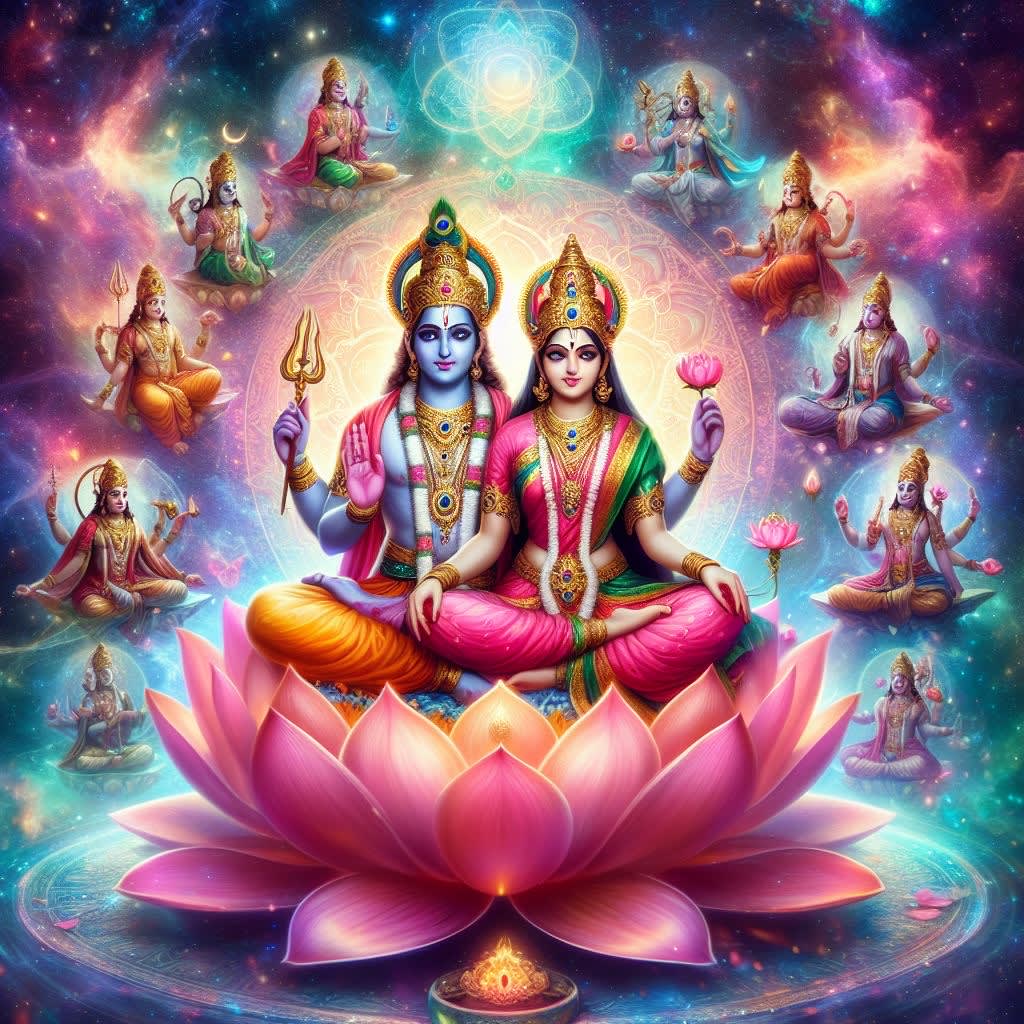10 Avatars of Lord Vishnu
Each and every avatar gives us important life lesson

The ten avatars of Lord Vishnu, known as the dasavatara, hold profound significance in Hinduism. Each avatar represents a specific purpose and imparts valuable lessons. Let’s explore them:
1.) Matsya (The Fish): Matsya rescued the first man and other creatures from a great flood. The lesson here is about preparedness and preservation. Just as Matsya warned people to save grains and living creatures, we should be prepared for challenges and protect what matters.
2.) Kurma (The Tortoise): Kurma supported the churning of the ocean to obtain treasures. The lesson is about endurance and supporting others. Like Kurma, we should patiently endure challenges and help those around us.
3.) Varaha (The Boar): Varaha raised the earth from the sea after the demon Hiranyaksha submerged it. The lesson is about resilience and protecting righteousness. Varaha’s determination teaches us to uphold what is right.
4.) Narasimha (The Man-Lion): Narasimha defeated the demon Hiranyakashipu. The lesson is about justice and fearlessness. Narasimha’s courage inspires us to stand up against evil.
5.) Vamana (The Dwarf): Vamana, disguised as a dwarf, defeated the demon king Bali. The lesson is about humility, contentment, and right use of power. Vamana’s story reminds us to remain grounded and just.
6.) Parashurama (The Warrior with an Axe): Parashurama rid the world of corrupt Kshatriyas. The lesson is about duty, discipline, and standing up against injustice. Parashurama’s unwavering commitment inspires us to fight for what’s right.
7.) Rama (The Ideal King): Rama, the central figure of the epic “Ramayana,” exemplifies righteousness, loyalty, and dharma. His life teaches us about duty, sacrifice, and the importance of family bonds.
8.) Krishna (The Divine Teacher): Krishna’s teachings in the Bhagavad Gita emphasise selflessness, detachment, and spiritual wisdom. His life demonstrates the balance between duty and devotion.
9.) Balarama (The Strong Sibling): Balarama symbolizes strength, loyalty, and brotherly love. His unwavering support for Krishna teaches us about the importance of family bonds.
10.) Kalki (The Future Warrior): Kalki is yet to appear, riding a white horse, to restore dharma. The lesson is about hope, transformation, and the promise of a better future.
How does Kalki relate to modern times?
Kalki, the tenth and final avatar of Lord Vishnu, is prophesied to appear in the future to restore dharma (righteousness) and bring about a better era. While Kalki’s arrival is yet to happen, we can draw some symbolic parallels between Kalki and modern times:
1.) Hope for Transformation: Just as Kalki represents hope for a better future, modern times also hold the promise of positive change. Despite challenges, humanity continues to strive for progress, justice, and harmony.
2.) Chaos and Corruption:
- Kalki is said to appear during a time of great chaos and moral decline. In modern times, we witness social, political, and environmental upheavals. Corruption, injustice, and ethical lapses persist.
- Kalki’s arrival signifies the need for a course correction, urging us to address these issues collectively.
3.) Technology and Prophecy: Modern technology allows us to communicate globally, share knowledge, and predict trends. Similarly, ancient prophecies like Kalki’s serve as reminders of our shared destiny and the importance of virtue.
4.) Environmental Crisis: Kalki’s white horse symbolises purity. In today’s context, environmental degradation threatens our planet’s purity. Kalki’s mission aligns with our responsibility to protect nature.
5.) Spiritual Awakening: Kalki’s purpose is to awaken humanity spiritually. In modern times, people seek deeper meaning, mindfulness, and purpose beyond material pursuits. Kalki’s message resonates with this quest.
Remember that Kalki’s significance extends beyond literal interpretation. It encourages us to reflect on our actions, uphold righteousness, and work toward a better world. 🌟
What White horse symbolises in Hinduism?
The white horse is associated with major spiritual meanings. It is linked to the sun and symbolises power, grace, and purity.
In Hindu mythology, the god Vishnu is often depicted riding a white horse named Kalki. Kalki is the tenth and final avatar of Lord Vishnu, prophesied to appear in the future.
Kalki represents spiritual awakening and enlightenment, signifying the journey toward higher consciousness.
As the mount of Lord Vishnu, the white horse embodies righteousness, victory, and the triumph of good over evil. It also symbolises purity and innocence
About the Creator
Enjoyed the story? Support the Creator.
Subscribe for free to receive all their stories in your feed. You could also pledge your support or give them a one-off tip, letting them know you appreciate their work.






Comments (5)
Narasimha is my favorite Dasavatara.
Good work. Don't take this the wrong way but this article reminded me of a deck of Tarot cards. I kind of believe for I had a reading and the things came true.
I respect you for the love you have for your country's religion.
Your writing is remarkable!
Very interesting and spiritual!